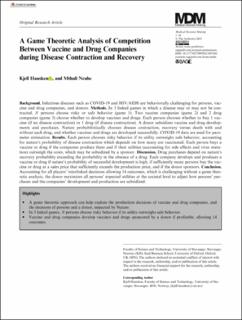A Game Theoretic Analysis of Competition Between Vaccine and Drug Developers During Disease Contraction and Recovery
Peer reviewed, Journal article
Published version
Permanent lenke
https://hdl.handle.net/11250/2830430Utgivelsesdato
2021-11Metadata
Vis full innførselSamlinger
Originalversjon
Hausken, K., Ncube, M. (2021) A Game Theoretic Analysis of Competition Between Vaccine and Drug Developers During Disease Contraction and Recovery. Medical Decision Making 10.1177%2F0272989X211053563Sammendrag
Background
Infectious diseases such as COVID-19 and HIV/AIDS are behaviorally challenging for persons, vaccine and drug companies, and donors.
Methods
In 3 linked games in which a disease may or may not be contracted, N persons choose risky or safe behavior (game 1). Two vaccine companies (game 2) and 2 drug companies (game 3) choose whether to develop vaccines and drugs. Each person chooses whether to buy 1 vaccine (if no disease contraction) or 1 drug (if disease contraction). A donor subsidizes vaccine and drug developments and purchases. Nature probabilistically chooses disease contraction, recovery versus death with and without each drug, and whether vaccines and drugs are developed successfully. COVID-19 data are used for parameter estimation.
Results
Each person chooses risky behavior if its utility outweighs safe behavior, accounting for nature’s probability of disease contraction which depends on how many are vaccinated. Each person buys a vaccine or drug if the companies produce them and if their utilities (accounting for side effects and virus mutation) outweigh the costs, which may be subsidized by a sponsor.
Discussion
Drug purchases depend on nature’s recovery probability exceeding the probability in the absence of a drug. Each company develops and produces a vaccine or drug if nature’s probability of successful development is high, if sufficiently many persons buy the vaccine or drug at a sales price that sufficiently exceeds the production price, and if the donor sponsors.
Conclusion
Accounting for all players’ interlinked decisions allowing 14 outcomes, which is challenging without a game theoretic analysis, the donor maximizes all persons’ expected utilities at the societal level to adjust how persons’ purchases and the companies’ development and production are subsidized.

